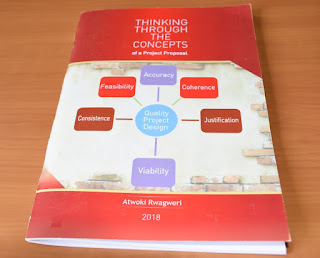 |
| Front cover of the book |
“Thinking
through the concepts of a project proposal” discusses the logical processes
behind designing and implementing a project. It is an attempt to reflect and
think through the familiar words we meet daily that we take them for granted
and are fixed and standard dogmas in our experience. For anyone who has
attained some level of literacy, writing a project proposal has become as easy
as getting regrets wherever it is submitted. Too many people writing bouncing
proposals, is a daily business, as others have gotten frustrated and left the
field. But do we ever pose to reflect on these concepts we communicate and how
we craft them to make a complete whole called a project? Do we ever reflect on
the one we are targeting for resources and what he may be interested in? A
project is a complex phenomenon, involving craftsmanship of coordinating
diverse actions to generate pre-determined effects.
After
implementing a programme funded by one donor for ten years and receiving
regrets from hundreds of other donors, I didn’t believe I needed any lecture on
project proposal concepts. One day I was challenged, at international level, to
evaluate a proposal using one question “Assess the viability and feasibility of
the proposed project”. The key words are only ‘viability’ and ‘feasibility’ but
these called for an intellectual analysis of every word in the document and
consulting volumes of documents to come up with a professionally acceptable
evaluation of the proposed project. When I returned to my duty station, I opened
my ten years old files of proposals I had submitted to numerous donors and only
earned regrets, after reading through one by one, I described them myself as “embarrassingly
unviable and unfeasible”. One begins knowing the moment he realizes that he
does not know and loses knowledge the moment he believes that he knows it all.
 |
| Back cover of the book |
At
times we put these concepts together by intuition and cram work and somehow get
it right but as senior development workers, we need to engage in fundraising as
a conscious and deliberate process.
This
book isn’t appropriate for those beginning to learn the concepts and formats of
a project proposal, as it will appear abstract and academic. It will help those
who want to reflect deeper on what they already know and master the art.
The
book is structured into three chapters. The first discusses the conditions and favorable
ground for a successful proposal. These include mastery of the field of intervention,
relevant institutional and professional background and having carried out feasibility
not only on the targeted problem but also the existing donor base. The second
chapter introduces the concepts that build up the underlying logic of the
project design. These concepts include viability, feasibility, coherence,
consistence, justification and accuracy. These are the concepts which are in
the minds of the experts as they evaluate project proposal documents. The third
chapter analyses the principles underlying the constructions of the sections of
the proposal document like title, situation analysis, objectives, activities,
results, workplan, assumptions, monitoring, sustainability, budget and
financing. I wish you good reading.
The
author Stephen Rwagweri Atwoki is the current Executive Director of Engabu Za
Tooro which is currently implementing a UNESCO co-funded project aimed at
safeguarding and revitalizing Empaako naming system among the Batooro, Banyoro,
Banyabindi, Batuku and Batagwenda and has been involved in publishing a number
of books.
You
can get a copy at Engabu Za Tooro main offices located on Plot 18, Kaija Road,
Kabundaire, Fort Portal – Uganda or contact the office on +256 (0) 483 422 187,
+256 (0) 772 469 751 or Email: info@engabuzatooro.or.ug,
engabuzatooro@gmail.com. To know
more about Engabu Za Tooro visit our websites: http://engabuzatooro.or.ug/, http://www.empaako.org/


